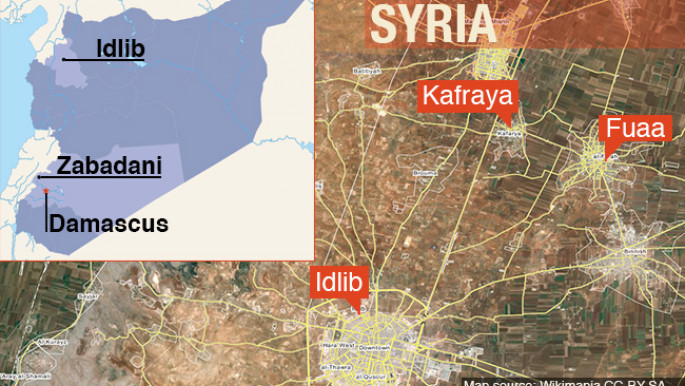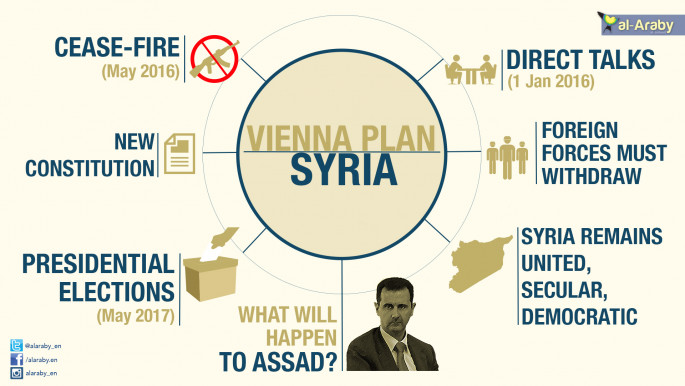Syria: Rebels evacuated from regime-besieged town, bombings rock Homs
The deal allows scores of rebel fighters who have been holed up for months in the town of Zabadani, near the Lebanese border, to have safe passage to Beirut airport to then head for their final destination of Turkey under International Committee of the Red Cross (ICRC) auspices.
Simultaneously, around 300 families in two besieged Shia towns in the mainly rebel-held northwestern province of Idlib will be heading in a land convoy to the Turkish border from where they will then fly to Beirut.
The route via Turkey is the safest for the families as traveling through Syria would take them through Idlib and a patchwork of rebel-controlled areas.
The UN and foreign governments have tried to broker local cease-fires and safe-passage agreements as steps toward the wider goal of ending Syria’s civil war, in which more than 250,000 people have been killed in nearly five years of fighting.
 |
Iran and Turkey, which back opposing sides in the Syrian conflict, helped bring about the local cease-fires in Zabadani and in the two villages in Idlib in September in the first phase of the deal.
The Zabadani area had been the focus of an offensive by Lebanese militant group Hizballah and the Syrian army against insurgent groups. The area is of importance to President Bashar al-Assad because of its proximity to the Syrian capital Damascus and the Lebanese border.
Insurgent groups have in turn launched attacks on the two Shia villages that intensified after most of Idlib province fell to rebels after a series of advances against the army this year.
Earlier this month Syrian government officials said they had agreed on a deal for rebel fighters to withdraw from the last insurgent-held area of the city of Homs with their weapons as part of a local cease-fire agreement.
Sources told Lebanese press a total of 123 people - 70 wounded militants and 53 women, children and elderly suffering from deterioration in their overall health - were evacuated from Zabadani.
In the rebel-held Shia villages of Kufreya and Al-Foua in the northwestern province of Idlib, a total of 338 wounded fighters and civilians had been evacuated, according to the sources.
They were taken by the Syrian Red Crescent to the Lebanese border crossing at Masnaa, where they will be met by delegates from the Lebanese Red Cross (LRC) and the International Committee of the Red Cross (ICRC).
A convoy of vehicles and ambulances belonging to the LRC and the ICRC had arrived earlier at Masnaa escorted by General Security cars.
Local sources told The New Arab's Arabic service humanitarian aid would be allowed into the besieged areas on Wednesday also as part of the deal.
Around 50,000 civilians are affected by the siege, and many have lost their lives from malnutrition and the lack of medical care.
 |
Twin explosion rocks Homs
At least 32 people were killed and 90 wounded in two bomb explosions in the Syrian city of Homs on Monday, monitoring group the Syrian Observatory for Human Rights said.
The blasts, one from a car bomb and another from a suicide attack, struck the Zahra district in the middle of the city, said the Britain-based Observatory, which monitors the conflict through a network of contacts on the ground.
Syria's state news agency SANA reported two car bomb blasts, but gave a lower initial toll of six dead and 37 wounded.
It was the second major attack in the city since a ceasefire deal took effect earlier this month, paving the way for the government to take over the last rebel-controlled area of Homs.
Twin blasts on Dec. 12, also in Zahra, killed at least 16 people. Islamic State claimed responsibility for that attack, saying it had detonated a suicide car bomb.
Under the Homs ceasefire deal, at least 700 insurgent fighters and members of their families left the last rebel-controlled area of the city, al Waer district. The United Nations presided over implementation of the deal.
With agencies





 Follow the Middle East's top stories in English at The New Arab on Google News
Follow the Middle East's top stories in English at The New Arab on Google News
![Israeli forces ordered bombed Gaza's Jabalia, ordering residents to leave [Getty]](/sites/default/files/styles/image_330x185/public/2176418030.jpeg?h=a5f2f23a&itok=_YGZaP1z)

